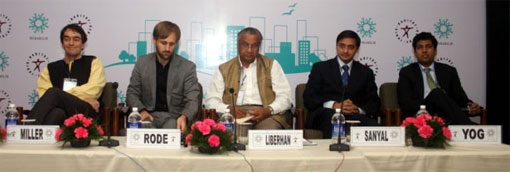Cities and Climate Change
India Habitat Centre
23 February 09
As part of a continuous dialogue between various
stakeholders and experts on urbanisation, the Urban
Habitats Forum Symposium on “Cities and Climate Change”
was hosted at the Silver Oak, India Habitat Centre, on
the 23 February 09. The Symposium saw participation from
over sixty experts.
Philip Rode, Executive Director, of Urban Age
and Associate at the Cities
Programme, LSE, set out the macro context of sustainable
cities in his presentation by drawing out the linkages
between urban density, and sustainability. He was
followed by Sanjeev Sanyal, Founder and Managing Trustee
of The Sustainable Planet Institute
and Senior Fellow at WWF-India, who
elaborated on the concept of ‘walkability’ as a
paradigm for urban development and planning. For him,
the concept of walkability holds the key for solving
contemporary urban problems. Sam Miller, Journalist and
Author, presented extracts from his latest book, 'Delhi:
Adventures in A Mega City', which also supplemented
Sanyal's advocacy of the walkability paradigm. Miller's
book captures his discovery of Delhi, which he
undertakes by walking around Delhi in a spiral.

From L to R:
Sam Miller, Journalist, and Author of
'Delhi: Adventures in a Mega Cities';
Philip Rode, Executive Director, Urban Age
and Associate, Cities Programme, LSE;
Raj Liberhan, Director, IHC;
Sanjeev Sanyal, Founder and Managing
Trustee, The Sustainable Planet Institute and
Senior Fellow, WWF-India;
Anupam Yog, Founder and Managing Director,
Mirabilis Advisory
|
|
 |
Quotes
|
 We
need to create cities that emphasize on
walkability. Walking is a great unifying
paradigm" We
need to create cities that emphasize on
walkability. Walking is a great unifying
paradigm"
Sanjeev Sanyal, Founder and Managing Trustee, The
Sustainable Planet Institute and Senior Fellow,
WWF-India
|
| |
|
 "City
governments can operate more effectively than
national governments when it comes to the link to
the residents and the citizens as they are closer
to their daily routines and daily lives" "City
governments can operate more effectively than
national governments when it comes to the link to
the residents and the citizens as they are closer
to their daily routines and daily lives"
Philip Rode, Executive Director, Urban Age and
Associate, Cities Programme, LSE
|
|
|
|